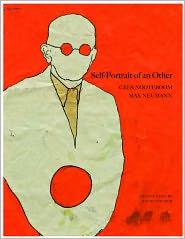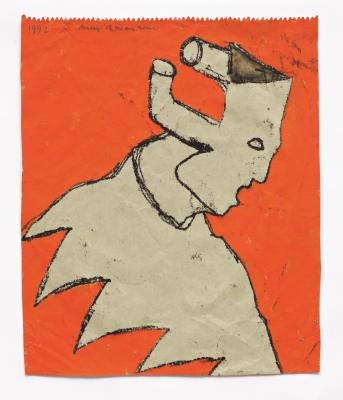Cees Nooteboom’s name appears perennially on the long list of candidates for the Nobel Prize for Literature. Born in 1933 in The Hague, he is one of the world’s most accomplished and adventurous writers, having produced 14 books of fiction and 26 non-fiction titles (mainly travel narratives). Eight of his novels are or were available in English translation, including his fourth novel Rituals (LSU Press, 1983), his most famous work.
 Seventeen years lapsed between the Dutch publication of his third novel and Rituals in 1980, during which he emerged as The Netherlands’ greatest poet. But unlike the verse of his peers Tomas Tranströmer and Zbigniew Herbert, his poetry is barely known in America. He has published 14 books of poetry in Europe – yet his Wikipedia custodians fail to list the single volume of English versions, The Captain of the Butterflies (Sun & Moon Press, 1997), a selection of splendid translations by Leonard Nathan and Herlinde Spahr.
Seventeen years lapsed between the Dutch publication of his third novel and Rituals in 1980, during which he emerged as The Netherlands’ greatest poet. But unlike the verse of his peers Tomas Tranströmer and Zbigniew Herbert, his poetry is barely known in America. He has published 14 books of poetry in Europe – yet his Wikipedia custodians fail to list the single volume of English versions, The Captain of the Butterflies (Sun & Moon Press, 1997), a selection of splendid translations by Leonard Nathan and Herlinde Spahr.
Rooted in the long tradition of Dutch realism, his novels are lightly basted with the more continental flavors of metafiction. But the poetry, now spanning seven decades, is where he has staked out with a pained urgency the themes that he later treats with a more gentle and comic touch in the novels. Among the Nathan translations are lines like these:
In my life winters get longer, colors drain,
the fear in my friends grows stronger.
Love fades from my face.
I fold myself in a poem and wait.
 More generally, his poetry is elliptical and fragmented, stricken by fissures, trained to observe the blurring between stony fact and alluring semblance. A tone of the slightest, most eroded irony. The sociability and philosophical asides of the novels dissolve into a skeletal solitude. The voice belongs to a person who would rather not peer into things but must do so anyway. Location and situation are bleached by the constancy of hours and everything is strange. The sun is “a ruined beast with a lens.”
More generally, his poetry is elliptical and fragmented, stricken by fissures, trained to observe the blurring between stony fact and alluring semblance. A tone of the slightest, most eroded irony. The sociability and philosophical asides of the novels dissolve into a skeletal solitude. The voice belongs to a person who would rather not peer into things but must do so anyway. Location and situation are bleached by the constancy of hours and everything is strange. The sun is “a ruined beast with a lens.”
Now, we may celebrate and enjoy David Colmer’s mysteriously moving translation of Nooteboom’s 1993 collection Zelfportret van een ander. Written in response to drawings by the German artist Max Neumann, the poems are accompanied by the art work. These disturbing prose poems, dense and evaporating, resonant with fear and uncertainty, re-process a lifetime of upheaval and instability.
He stood at the open window of a train and it was war. Later, all he remembered of that journey was the goodbye, not who from. People on the platform, the dusky height of the arched roof, his mother perhaps in an unforgivable hat. The children on the train waved paper flags. The picture has now turned black and white, the black of crows, not the white of snow. The landscapes he must have seen have been erased, like his thoughts and the words he may or may not have said. All that’s left is a girl whose face has disappeared. She squatted in a hostile, hillside meadow and pissed with her legs spread, her child’s body turned towards him. The eye between her legs moved, looking at him from behind its arc of water. Fear never rusts. Later in life he often passed through that railway station. A yellow-haired girl in a corner, her back to him, a needle in her arm. An African with ochre eyes, his black skin turned grey. A man in rags, crucified on the marble floor. He thinks of the sound of the train engines, the white steam engulfing the faces. There must still be photos with him in them, photos in which he didn’t want to see himself. The number of lives in an old body is unbearable.
Think of what it takes to write that final line, and what must occur in the poem before such a line is deserved. Self-Portrait of an Other comprises 33 poems that represent a sort of Dantean journey through an infernal century. Just as in Dante’s case, the passage ends with an emergence that is awareness itself – a firm sense that “transmigration of the soul does not happen after but during a life.”
 In a short concluding note, Nooteboom describes the moment he met Max Neumann at a party in Berlin. In his typical unblinking fashion, Nooteboom first recalls “the sudden attacks of emptiness” one experiences at a social gathering, “the eyes that stop looking at you and drift off your shoulder, the last sentence you didn’t quite catch, the forgotten names, the concealed differences of opinion, the underflow of gossip and the subtle doubt that needs to be drowned out.” Then he notices Neumann sitting calmly, quietly talking with the only other seated person in the room. Neumann seems to equal an appropriate “other,” a twin. About Neumann’s drawings, Nooteboom says, “I would draw on its atmosphere and my own arsenal of memories, dreams, fantasies, landscapes, stories and nightmares to write a series of textual images as an echo but unlinked, a mirror, but independent of the pictures he had given me.”
In a short concluding note, Nooteboom describes the moment he met Max Neumann at a party in Berlin. In his typical unblinking fashion, Nooteboom first recalls “the sudden attacks of emptiness” one experiences at a social gathering, “the eyes that stop looking at you and drift off your shoulder, the last sentence you didn’t quite catch, the forgotten names, the concealed differences of opinion, the underflow of gossip and the subtle doubt that needs to be drowned out.” Then he notices Neumann sitting calmly, quietly talking with the only other seated person in the room. Neumann seems to equal an appropriate “other,” a twin. About Neumann’s drawings, Nooteboom says, “I would draw on its atmosphere and my own arsenal of memories, dreams, fantasies, landscapes, stories and nightmares to write a series of textual images as an echo but unlinked, a mirror, but independent of the pictures he had given me.”
Experimental, liberated and entirely responsible to the shocks of reality, Self-Portrait of an Other is thick with rivers, forests, islands, oceans, and mountains — and also cadavers, stray dogs, sickbeds, suicidal armies, wrecked ships. How many passing strangers?
This book makes a strong case for a more complete treatment of Cees Nooteboom’s poetry in English.
[Published by the University of Chicago Press on November 15, 2011. 76 pages, 8.5 x 11 format, 33 drawings, $25.00 hardcover]
For more commentary on Cees Nooteboom’s novel Lost Paradise, click here.
Seagull Books as publisher
Dear Mr Slate:
Thank you so much for this wonderful review. It is a strikingly good appraisal of the work and we are very proud of it. It’s just that the book is published not by University of Chicago Press but by Seagull Books (www.seagullbooks.org). We are, of course, distributed worldwide by Chicago. We are a small but devoted publisher and it is important for us that our little role in making the book possible get due credit 🙂
It will be great if you can change the name of the publisher, please.
And thank you again!
Bishan.